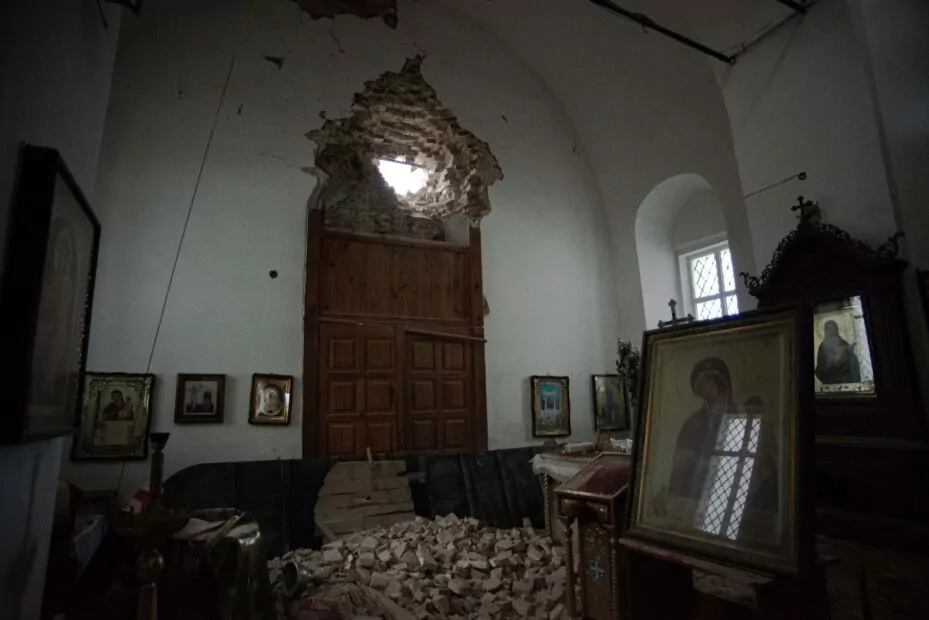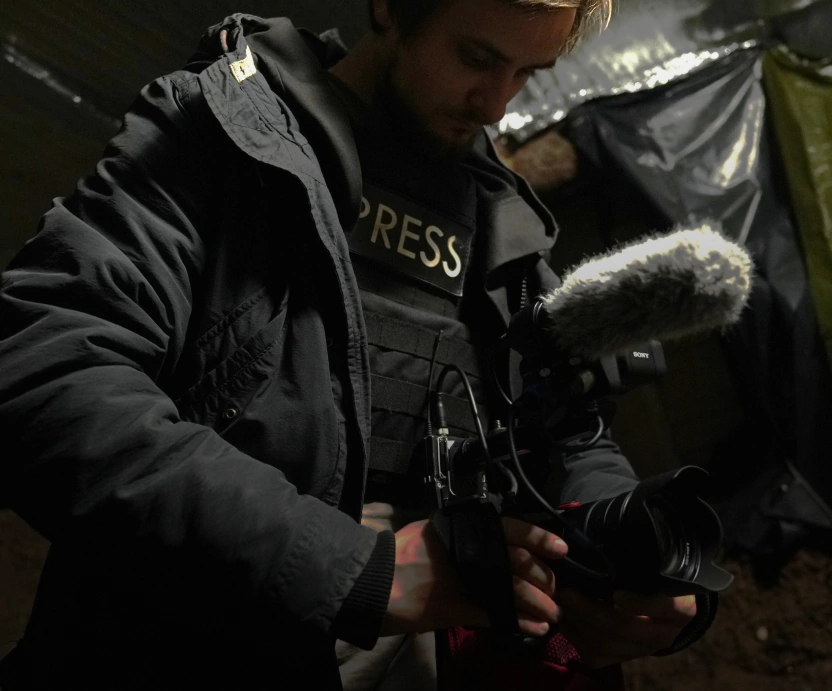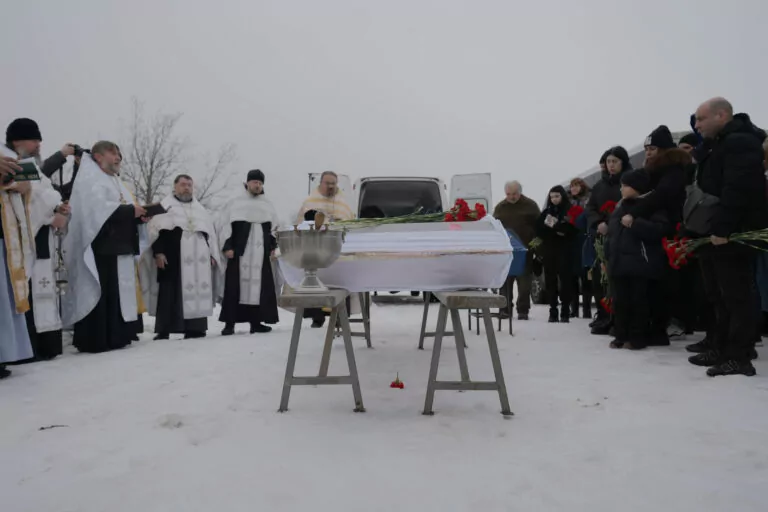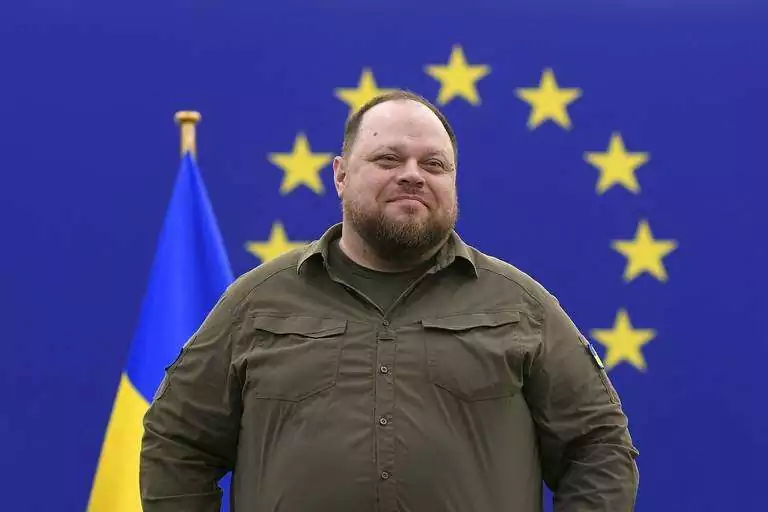Serhiy Movchan is the head of the Documentation Department of the Ukrainian Helsinki Union for Human Rights. Since 2016, he has been documenting war crimes committed by the Russian Federation, starting from the occupation of Crimea and Donbas. In 2020, Serhiy made a break in his career to deal with the topic of anti-corruption. However, in February, when the full-scale war began, he returned to documenting war crimes and headed the corresponding direction of the Union.
The human rights defender is the hero of the film #Attackoncivilians, which Gwara Media is shooting in partnership with Deutsche Welle.
We interviewed Sergiy about the importance of monitoring the violations, whether it will help punish the guilty, and the scale of the tragedy today.
Let us start with the definitions. What does the term “war crime” mean, and what exactly are you documenting?
A war crime is a violation of the norms of international humanitarian law reflected in various sources, for example, the Geneva Conventions. The biggest document describing war crimes is the Rome Statute of the International Criminal Court. Also, we may find the concept of “war crime” in national legislation and in the Criminal Code of Ukraine.
My team documents the destruction of civilian objects, namely residential areas, medical, educational, and cultural institutions.
In terms of civilians, we record murders, mutilations, wounding, captivity, and torture in captivity. If we are talking about the military, we primarily investigate inhumane treatment and torture. We also record gender-based violence, that is, sexual. In fact, the entire range of the Russian army’s actions on the territory of Ukraine.
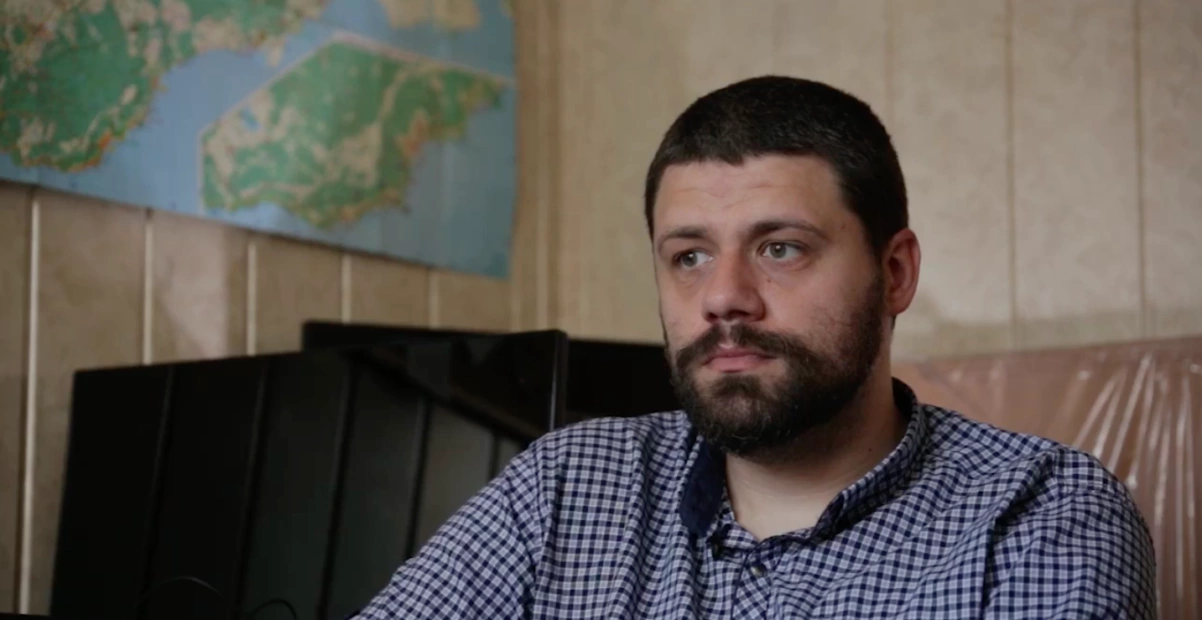
How is the whole process organized?
First, we analyze open sources (as it is impossible to conduct qualitative research without understanding the scale) and interview witnesses and victims of crimes. After that, we give collected data for legal support to national and international institutions.
Which other organizations in Ukraine document war crimes?
In 2014, there were few public organizations doing this. After February 24, 2022, the list of such has remarkably expanded.
I suggest dividing these subjects into the public and private sectors. In the public sector, these are primarily law enforcement agencies. Today, the Ministry of Reintegration, the Ministry of Culture, and the Ministry of Education have also joined the process of documentation. Even the Ministry of Foreign Affairs now has its own resource aimed at documenting war crimes.
As for the private, and non-governmental sectors, we must mention the journalists’ significant work. Today many of them have retrained to become documenters. These are also non-governmental public organizations, such as the Helsinki Union, which is part of the “Tribunal for Putin” initiative.
Is documentation a complicated process?
Physically no. It is complicated morally because we work with people who have lost their loved ones and experienced grief. It leaves a mark on you. What does it look like? First, we draw up the documents, namely questionnaire data and consent to personal data processing. Next, the interview process begins. We spend a lot of time researching each story. Also, it takes time to decrypt the data and issue the protocol. If a person has injuries or photos of the events or circumstances, the human rights defender should also process them. The number of these documents depends on case to case. Sometimes, there are only several pages of the protocol; sometimes, there are several gigabytes of information.
How does documentation help the average civilian?
Unfortunately, a person sharing their story is not always able to help themselves. There are many circumstances that can prevent people from getting compensation: the loss of documents or relevant evidence, for instance.
However, if there are many such individual stories, it indeed can help others. For example, it can assist in forming complaints to the International Court of Human Rights and a lawsuit against the Russian Federation. The materials can also be transferred to the UN and the International Criminal Court. At the same time, the collected data will proceed to the national level because people apply for compensation for destroyed property. Sometimes, we can gather 10 different interconnected stories, and in the end, there will be only one applicant.
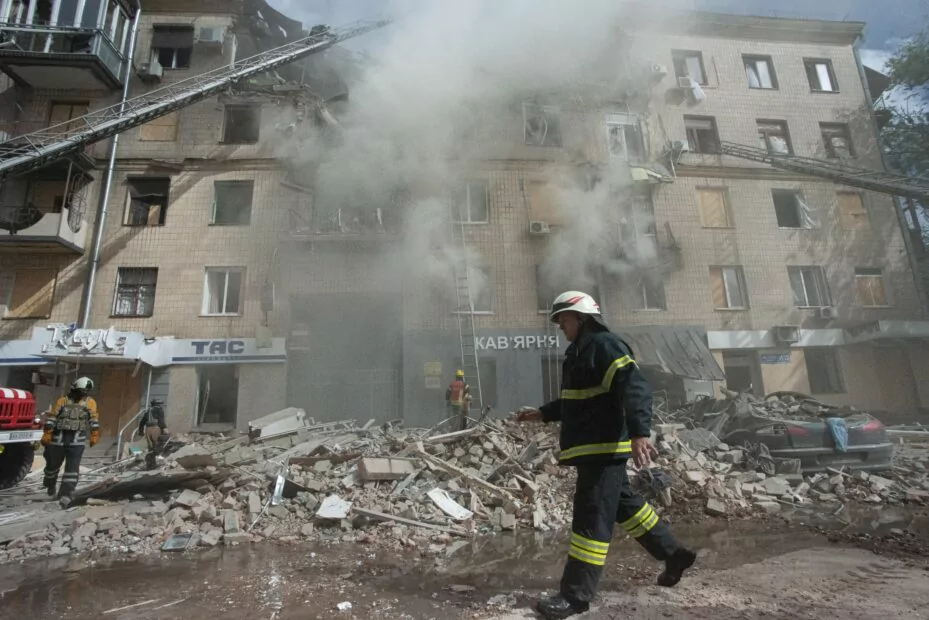
Given law enforcement agencies, why do we need human rights defenders? What is the distribution of tasks between sectors?
Let us face the truth: the chief prosecutor’s office [as of the end of July — ed.] states there are already more than 23,000 proceedings under Article 438, which deals with war crimes. Can you imagine the scale?
Even if to allocate a prosecutor to each proceeding, there will not be enough people. The prosecutor’s office’s entire staff is less than 15,000 people, including vacant positions. It’s hard to work under such conditions.
It is also worth noting that law enforcement agencies cannot find all victims, as there are people who do not trust them. Although improving recently, Ukrainian citizens’ trust level in law enforcement agencies remained low. However, people are often ready to communicate with journalists and human rights defenders. That’s why we are needed.
Some state representatives claim that only prosecutors should be involved in documenting war crimes, as they are professionals. I would like to ask, how many people from the prosecutor’s office have dealt with war crimes before?
According to statistics, most prosecutors quit the prosecutor’s office after two or three years of work. Such a staff turnover does not allow to work systematically.
Few people work long in the public sector either. However, some organizations have been documenting war crimes for nine years: they have a system, databases, and an understanding of the process.
Is it possible for a person to document a war crime themselves?
Yes, there are apps allowing to document the violations. For example, iWitness with a help of which you can take a photo and send materials to appropriate authorities. You can also directly contact the needed NGO.
How do you find respondents? Or do they get to you?
It depends. We find someone through friends or contacts given to us by the interviewees. We are now encouraging our citizens to email us their stories. For example, recently, someone texted us from Nova Kakhovka, which is interesting as now this city is occupied, and we don’t have much material about it.
So, a chain effect works, and we gather stories by getting in touch with people who left their contacts.
What else can be considered a war crime?
Everyone talks about the destruction of infrastructure and murders. But we often forget that ecocide, for example, is also a war crime. The destruction of Ukrainian educational institutions, their militarization, and the reconfiguration to the Russian system are crimes as well. Few people mention it.
Can you imagine, today we already have 8-year-old children who were born and still live in the occupied territories, not knowing that this territory was Ukrainian? This issue will remain essential in the future, too.
So, war crimes concern not only the destruction but also the damage to education, culture, and ecology.
Is it true that not all victims are ready to talk about crimes? What do you do in such cases?
It’s true. It happens that you agreed to an interview, arrived at a place, and a person wishes you to follow the direction of a Russian ship. But I understand it, as the person may not be ready.
We gently ask people to share their stories, as we cannot force them to experience grief again.
Once a respondent called again and agreed to tell his story after six months.
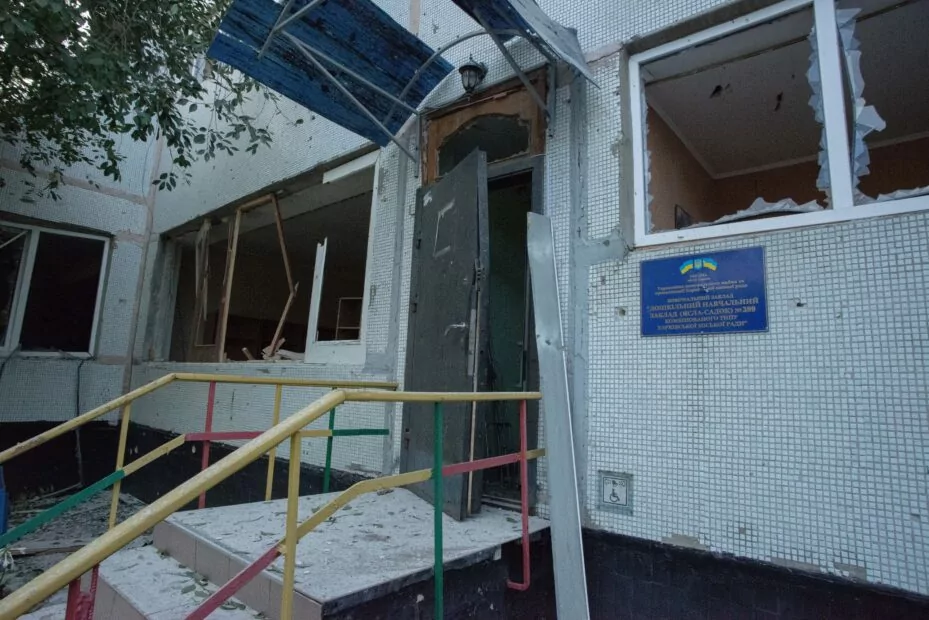
Will such cases lose their actuality if a person delays in responding?
Yes, the European Court of Human Rights has its deadlines.
The term of appeal to the European Court of Human Rights is four months from the moment of violation. For example, if a person was injured on February 24 and came to us on June 25, European Court will just ignore their case.
Although, it may still be actual for other institutions.
So, it is important to inform people about these deadlines.
In the case of the European Court, the application must arrive at the post office no later than 11:59 p.m. on the last available day of application. If you ever arrived at Kyiv CTS after 11:00 p.m., you might have noticed many attorneys in suits sending legal documents en masse near the Post Office. I think it’s the same in other cities.
It is vital to remember that the term of four months applies to so-called finished violations. If we are talking about ongoing captivity, then the countdown begins from the moment when the person is released. Generally, war crimes do not have a statute of limitations. International Criminal Court has no such deadlines.
What are the other Union’s responsibilities today?
We do analytics. We analyze the collected materials and advocate Ukraine at the international level, at various platforms: the UN, OSCE, etc. Communication is necessary as it attracts the attention of foreign partners.
Can you name the minimum and maximum results Ukraine can achieve in the courts?
The maximum is bringing to justice all persons involved in armed aggression against Ukraine for 9 years, meaning every participant, including those giving orders and those supporting the armed invasion. We can at least apply sanctions to them.
It is necessary for people to understand that they will have to pay for the support of the armed aggression of the Russian Federation.
The minimum result is to bring to justice the leadership responsible for the war and to receive compensation for destruction in Ukraine.
But in fact, at the level of citizens, the minimum is at least compensation for personal losses.
Therefore, the possible result ranges from compensating individuals to holding everyone involved accountable.
You mentioned the “Tribunal for Putin” initiative. Why do we need it, and is it really a tribunal?
Let’s face that the International Criminal Court will not hear all cases. It will consider the 3-5 blatant episodes with the most quality evidence base. In turn, national courts will primarily deal with perpetrators: those who rape and kill.
As part of this initiative, we are talking about the responsibility of everyone involved — not just Putin as an individual.
Such tribunals really work. The Nuremberg trials after the Second World War are a striking example of how to bring to justice many perpetrators. There are similar tribunals in Yugoslavia (by the way, those war criminals are still wanted!).
It’s difficult to say how exactly it will happen in Ukraine. There are various ways to do it. As human rights defenders, we hope for a tribunal that will make it possible to find all those involved, even if the search continues for 10 or 20 years.
Interviewed by Sergiy Prokopenko
Edited by Olena Myhashko
Translated by Yuliia Kulish
This material was developed by Gwara Media as part of the IWPR program “Supporting regional media of Ukraine during the war” with the support of the European Union, the Ministry of Foreign Affairs of Norway, and the Ministry of Foreign Affairs of Great Britain.
The content of the material is the sole responsibility of Gwara Media. It does not reflect the views of the European Union, the Ministry of Foreign Affairs of the Kingdom of Norway, the United Kingdom Government or the Institute for War and Peace Reporting.
